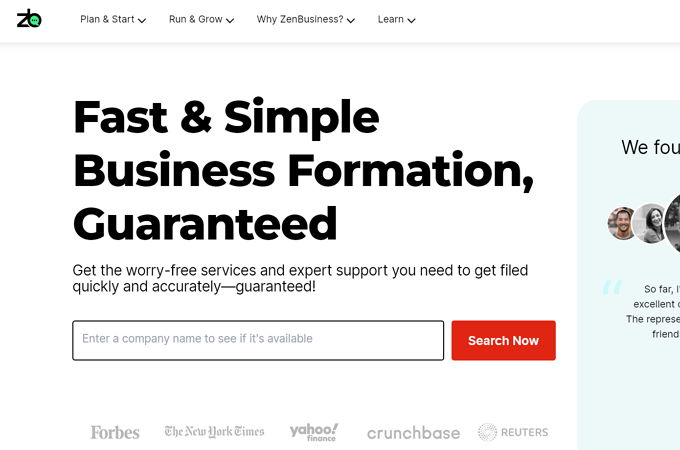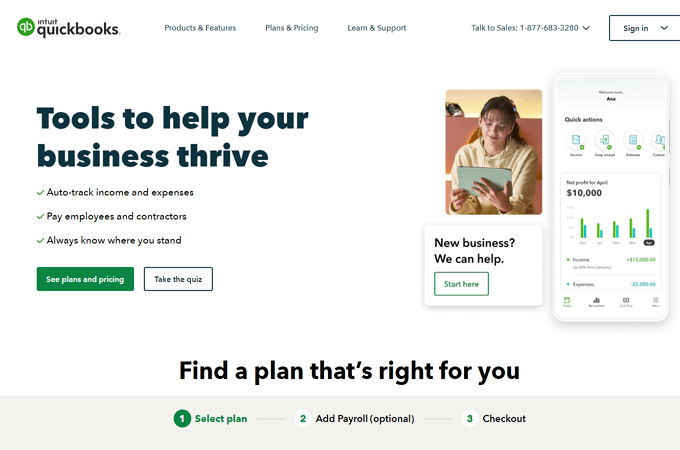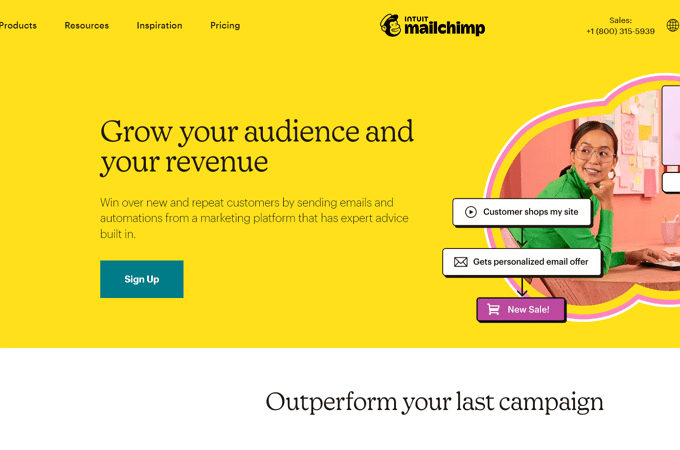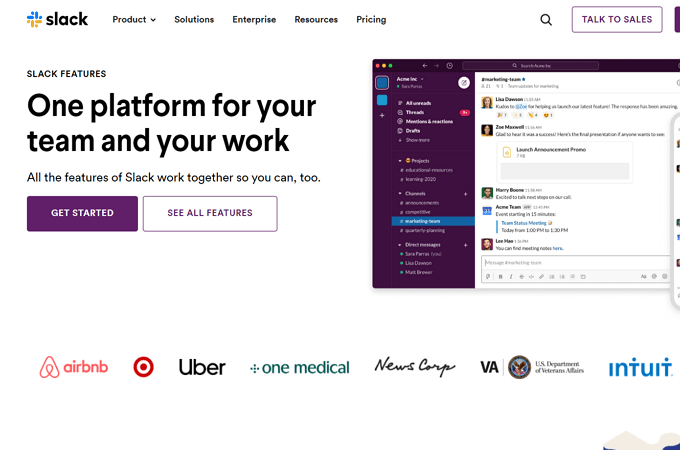Starting a business is now more cost-effective and easier than ever before. With technology making it possible to work from anywhere, more people are venturing out on their own to be their own boss.
Whether you want to travel, control your income, work on your own terms, or get up in the morning without setting an alarm, there are plenty of reasons to work for yourself.
But for single-person business owners, there can be some confusion around which business structure is right for them. Do you operate as a self-employed individual or set up an LLC?
In this quick guide, we’ll break down the key differences between self-employed vs. LLC so that you can make the best decision for your business.
The Top-Rated LLC Services to Help You Get Started
If you decide that formally registering your business is worth it, here are the top-rated LLC services that can help get you started:
- ZenBusiness – Best overall
- Incfile – Best for entrepreneurs on a tight budget
- Rocket Lawyer – Best legal consultation services for LLCs
- LegalZoom – Most popular LLC services
- LegalNature – Best for LLC documents and contracts
- MyCompanyWorks – Best same-day processing
- Swyft Filings – Best customer service
To read our in-depth reviews of each service and who they’re best for, check out the full review here.
What Is Self-Employment?
Self-employment is the state of working for oneself rather than an employer. Those who are self-employed usually generate income from various sources, including freelance work, consulting, and investments. This is often the first step for those who decide to start a side hustle.
Self-employed individuals are not subject to the same rules and regulations as traditional employees, which gives them greater flexibility in how they structure their work life.
However, self-employment also comes with a greater degree of risk and responsibility. Self-employed individuals must be diligent in managing their finances and ensuring that they have sufficient income to support themselves.
In addition, self-employed individuals do not enjoy certain benefits that salaried workers do, such as unemployment insurance and paid vacation days.
Since they do not have an employer that pays half of their Social Security and Medicare taxes, self-employed individuals must pay the entire amount themselves. This is often referred to as the “self-employment tax,” which is levied at a rate of 15.30%
Despite the challenges, self-employment can be a rewarding way to earn a living. Those who are successful in self-employment often relish greater levels of freedom and satisfaction than those who work for someone else.
What Is an LLC?
A limited liability company, or LLC, is a business entity that provides limited liability protection to its owners. Unlike a corporation, an LLC is not legally required to have separate management and ownership structures.
LLCs can be managed by their members or by one or more managers appointed by the members.
The members of an LLC are not personally liable for the debts and liabilities of the LLC unless they have personally guaranteed those debts or liabilities. This means that if the LLC goes into debt or is sued, the members’ personal assets are safe from creditors and claimants.
However, members may still be held personally liable for their own negligent or illegal actions. For example, if an LLC member knowingly participates in fraudulent activities, that member can be held personally liable for any damages resulting from those activities.
LLCs are popular business entities because they provide limited liability protection without the formalities and complexities of a corporation.
The Basics of Self-Employed vs. LLC
So, what’s the difference between self-employment and an LLC? Let’s take a closer look at each business structure to see how they compare.
Self-Employment
A self-employed individual is anyone who works for themselves. For tax purposes, the IRS considers self-employment to be any work that is done “in exchange for money or other property.” This includes freelance work, consulting, and investments.
Self-employed individuals are not considered employees of their clients or customers. As such, they are not subject to the same rules and regulations as traditional employees.
Examples of self-employed individuals include:
- Freelancers
- Investors
- Local handymen or contractors
- Independent contractors
- Consultants
- Small business owners
When paying taxes, the IRS will tax the self-employed person’s business income as personal income. This means the self-employed person will need to file a personal tax return and pay taxes on their business income at their individual income tax rate. The good news is that self-employed people can deduct certain business expenses from their taxable income.
LLC
LLCs and self-employed people have a few things in common. First, neither is considered an employee of their clients or customers. And in the case of single-member LLCs, the IRS taxes LLC business income as personal income.
Many freelancers, investors, consultants, and other self-employed individuals choose to form LLCs to protect their personal assets.
And therein lies the difference.
The main benefit to LLCs is that they provide their owners with limited liability protection. If an LLC finds itself in legal trouble, its members do not need to worry about losing their personal assets, like their homes or cars.
While some self-employed individuals may also enjoy some level of protection from creditors, most of them are held personally liable for the debts and damages incurred by their business.
From a corporate standpoint, another benefit of LLCs is that they are not subject to the same formalities and complexities as corporations.
For example, LLCs do not require separate management and ownership structures. And for tax purposes, many rules and regulations apply to corporations that do not apply to LLCs.
So Should I Choose to Be Self-Employed or Form an LLC?
Ultimately, whether you decide to form an LLC or remain self-employed depends on a few factors:
- Your personal needs and goals
- How much time and effort you plan to put into your business
- The amount of money you plan to make
- The level of risk you are willing to take on
- Your tolerance for paperwork and compliance
The first thing you’ll want to consider is your goals. If you only want to take on one or two clients, or only make money from your business occasionally, it may not make sense to form an LLC. The extra paperwork and compliance requirements can be a hassle, and you may not need the limited liability protection an LLC provides.
But if you plan to take on multiple clients, make a lot of money, or take on work as a part-time or full-time job, you should definitely form an LLC.
The amount of time it takes to set up an LLC is relatively minimal, and the benefits you’ll enjoy—like limited liability protection and a simplified tax structure—can be well worth the effort.
And if you plan to operate as a business, formally creating one will also make you appear legitimate to prospective clients and customers.
So, if you’re still on the fence about whether to form an LLC or remain self-employed, ask yourself how much time and money you want to put into your business and what kind of risks you’re willing to take on.
If you plan to take your business seriously beyond a few sales or small clients, an LLC is always a good way to go.
6 Tools to Start and Grow Your LLC
If you decide to take the leap and start your LLC, you’ll need to take care of a few things first. These six tools can help you get started.
ZenBusiness
When it comes time to form your LLC, the best platform to do so with is ZenBusiness. It is relatively new when compared to other LLC formation services, but it is simple to use and affordable.

Its modern, user-friendly interface is a pleasure to use, and it offers plenty of features, such as registered agent service and custom operating agreements.
It also includes name availability search and filing in all 50 states.
An EIN is included in the Starter plan, but you can include it for $99 if you don’t feel like upgrading, though their Pro subscription offers the best value.
QuickBooks
Once you have your LLC formed, you’ll need to start tracking your expenses and income. QuickBooks is one of the most robust accounting tools on the market and is perfect for small business owners and self-employed individuals.

While it can be a bit overwhelming at first, QuickBooks is essential for keeping track of your business finances.
It offers features like invoicing, tracking expenses, and running reports. You can also use it to manage your payroll and taxes.
And if you decide to upgrade to the paid version, you’ll get access to even more features, like time tracking and project management.
QuickBooks also offers a separate product, called QuickBooks Self Employed, which is specifically designed for self-employed individuals and freelance contractors.
Often used by rideshare drivers, freelancers, realtors, and gig workers, Self Employed by QuickBooks includes features like expense tracking, mileage tracking, and invoicing.
It also offers a tax deduction tracker to ensure you’re taking advantage of all the deductions you’re entitled to.
Trello
Trello is a great tool for organizing your business tasks and keeping track of projects. It’s perfect for small businesses and solopreneurs who need a simple way to organize their to-do lists and get things done.

Trello offers a variety of features, such as the ability to create boards, add tasks, set deadlines, and assign team members to specific tasks. You can also use it to track your progress on projects and see what’s been completed.
Trello is free to use, but a paid version also offers more features, such as the ability to add attachments, create custom fields, and use Power-Ups. However, these are generally not necessary for most small businesses.
WordPress
If you want to bring your online business idea to life, there is no better platform to do it with than WordPress. WordPress is a content management system (CMS) that allows you to create a website or blog from scratch without any coding knowledge.

It is one of the most popular site-building platforms in the world and is used by millions of businesses, including many small businesses and solopreneurs.
While WordPress is free to use, you will need to pay for hosting and a domain name. But once you have those set up, you can create a professional-looking website or blog without any prior experience.
There are thousands of themes and plugins available for WordPress, so you can customize your site to look however you want it to. And if you need help, a large community of WordPress users is always willing to lend a hand.
Mailchimp
You may not need to use Mailchimp right away, but it’s a good idea to set up an account so you’re ready to go when you need it.
Mailchimp is a tool that allows you to send newsletters, create email marketing campaigns, and automate your email marketing. It’s perfect for small businesses and solopreneurs who want to stay in touch with their customers and build relationships.

Mailchimp offers a free plan that allows you to send up to 9,000 emails per month. However, if you need more features, such as the ability to automate your email marketing or use advanced segmentation, you’ll need to upgrade to a paid plan.
While there are other email marketing platforms out there, Mailchimp is one of the most popular and user-friendly. It can’t do everything, but it’s a great tool for those who are starting out.
Slack
You might not need it right away, but Slack is a great tool for anyone who works with clients, independent contractors, virtual assistants, or other team members.
Slack is a communication platform that allows you to send messages, create channels, and make video and audio calls. The Pro version also allows you to share files, create polls, and use a variety of other features.

The best thing about Slack is that it integrates with countless other business tools, including project management software, Google Suite, and Dropbox. This makes it easy to keep all your business communications in one place.
3 Tricks for Staying Productive When You’re Self-Employed
Whether you’re operating as a self-employed sole proprietor or an LLC, one challenge you’ll run into is staying productive as someone who works for themselves. It can be easy to get sidetracked when there’s no one else around to hold you accountable.
But there are a few tricks you can use to stay on track:
1. Keep a to-do list or a daily schedule
A to-do list can keep you on track with your work and help you prioritize your tasks. There are a few different ways to create a to-do list. You can use a physical notebook, an online tool (like Trello), or even just a simple Excel spreadsheet.
Doing so will help you stay organized, which will play an important role as your business grows.
If you’re working on a project, you should also set a deadline for when you want it to be completed. This will help you stay focused and motivated even when finding motivation seems challenging.
And if you find that you’re struggling to meet your deadlines, try breaking the project down into smaller tasks or sprints. This will make it feel less daunting and help you stay on track.
2. Automate manual processes wherever you can
Many little things can eat up your time, like scheduling social media posts or responding to customer emails.
While you can’t automate everything, there are some manual processes that you can automate. For example, if you’re using Mailchimp for your email marketing, you can set up automation rules so that certain emails are sent automatically based on triggers (such as someone subscribing to your list).
3. Hire a virtual assistant
There are some tasks that you can’t automate. But taking time out of your day to do them may take your attention away from other important tasks. That’s where a virtual assistant comes in.
A virtual assistant can handle things like customer service, appointment scheduling, and other administrative tasks. This will free up your time to focus on the tasks only you can do.
Hiring a virtual assistant doesn’t have to be expensive, either. You can find quality virtual assistants on websites like Fiverr or Upwork at affordable wages.
There are a number of other tools and resources that can help you as well. But these three should get you off to a good start.
What to Do Next
Once you’ve decided to go the self-employed route and have registered your business, your next step will be to grow it into a sustainable and profitable operation.
This may include selling to others, marketing your products or services, creating content, or finding new ways to generate revenue.
But no matter what you do, remember that the most important thing is to enjoy the journey and learn from your mistakes along the way. With hard work and dedication, you’ll be on your way to success in no time.
If you’re ready to explore other options, read our blogs about types of content that will drive more traffic and how to create a website.
